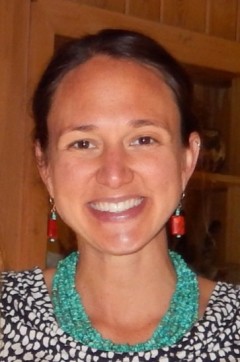Catarina Passidomo Receives Fulbright Award to Study Foodways in Peru
 University of Mississippi professor Catarina Passidomo is looking forward to traveling to Lima, Peru, to teach and conduct research in 2019 as the recipient of a Fulbright US Scholar award. While in Lima, the UM assistant professor of anthropology and Southern Studies will teach two courses in the Department of Social Sciences at the Pontifical Catholic University of Peru. She also plans to engage in independent and collaborative research on Peruvian cuisine and foodways for a project titled “Gastrodiplomacy in Peru: Cuisine as Nation-Brand in Postcolonial Context.”
University of Mississippi professor Catarina Passidomo is looking forward to traveling to Lima, Peru, to teach and conduct research in 2019 as the recipient of a Fulbright US Scholar award. While in Lima, the UM assistant professor of anthropology and Southern Studies will teach two courses in the Department of Social Sciences at the Pontifical Catholic University of Peru. She also plans to engage in independent and collaborative research on Peruvian cuisine and foodways for a project titled “Gastrodiplomacy in Peru: Cuisine as Nation-Brand in Postcolonial Context.”
“As a scholar of southern foodways, I have taught and directed research that uses food as a lens to explore social and cultural phenomena: who has power in a society and who lacks it; how people interpret or remember the past; how race, class, and gender identities influence what and how people produce, consume, and think about food,” Passidomo wrote in her Fulbright application. The grant period is four months, beginning in March 2019.
“I first became aware of Peru’s culinary renaissance—what is often referred to as its ‘gastronomic boom’—the explosion of global interest in Peruvian food and the tremendous national pride that accompanies it—during a CIEE Faculty Development Seminar on Peruvian Foodways in Lima during the summer of 2015,” Passidomo said.
“Funding for that seminar was provided by the Provost’s Faculty Development Award for Campus Internationalization, which allowed several UM faculty members to participate in CIEE programs all around the world. Thanks to a College of Liberal Arts Summer Research Grant, I was able to return to Peru in 2016.”
Passidomo, who also works closely with the Southern Foodways Alliance, said she is ecstatic about the opportunity. “This allows me to do what I’ve been wanting to pursue for a long while,” she said, “and it’s a synergistic opportunity to combine food and identity in the two regions.”
Once a year, Passidomo teaches Southern Studies 555: Foodways and Southern Culture, an innovative class available to graduate students and advanced undergraduates. She also is also a successful teacher outside the classroom, said Ted Ownby, director of the Center for the Study of Southern Culture. “People come to foodways scholarship from lots of directions, and Catarina has done an excellent job both listening and teaching,” Ownby said.
Passidomo leads the Southern Foodways Alliance fall graduate seminar in foodways by both critiquing and encouraging papers and presentations in the quickly changing academic field of foodways scholarship. At one Southern Foodways Symposium, she served as scholar-in-residence, introducing talks by various speakers, connecting them to each other, raising academic questions to an audience that mixes many people, only a few of whom are professional scholars.
Passidomo serves on the SFA’s academic committee, which is committed to setting high academic standards for the organization’s projects, and she is a mentor to University of Mississippi students outside the classroom, serving as a faculty adviser for the Real Food Rebels at the University of Mississippi student group.
The Fulbright program, which aims to increase mutual exchange between the people of the United States and of other countries, is the flagship international educational exchange program sponsored by the US government.
Fulbright alumni have become heads of state, judges, ambassadors, cabinet ministers, CEOs, and university presidents, as well as leading journalists, artists, scientists, and teachers. They include fifty-nine Nobel laureates, eighty-two Pulitzer Prize winners, seventy-one MacArthur fellows, and sixteen Presidential Medal of Freedom recipients.
The Fulbright offers fellowships for teaching, research, and teaching/research. Passidomo’s award is teaching/research, part of the Educational Exchange Program between Peru and the United States.
A native of Naples, Florida, Passidomo received her doctorate in human geography from the University of Georgia in 2013. She also holds a master’s degree in ecological anthropology from the University of Georgia and a bachelor’s degree in sociology and anthropology from Washington and Lee University.
